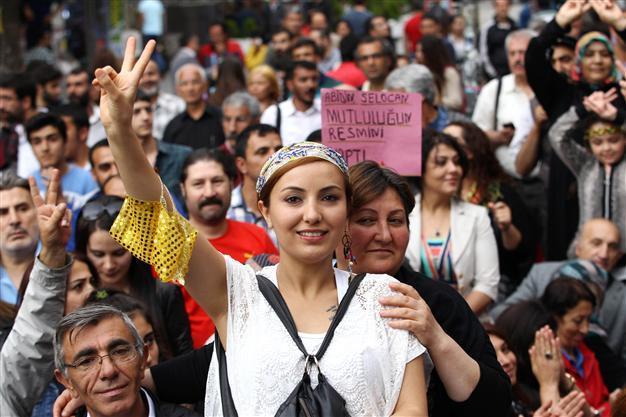Slight rise in AKP support after results announced: IPSOS poll
ISTANBUL

A supporter of pro-Kurdish People's Democracy Party (HDP) makes a victory sign as she celebrates the results of the HDP party as part of the legislative election in Ankara, on June 9, 2015. AFP Photo
Shortly after unofficial results of Turkey’s general election were announced, a majority of voters told a poll that they would still vote for the same party, though there is a slight increase in the Justice and Development Party’s (AKP) vote and a slight decrease in the votes of the Peoples’ Democratic Party (HDP) and the Nationalist Movement Party (MHP).While the AKP would have seen a 4 percent increase if voters had known the election results beforehand, the MHP would have seen a 2 percent decrease and the HDP would have seen a 1 percent decrease, according to research conducted by IPSOS prepared for private broadcaster CNN TÜRK a day after the June 7 election.
The Republican People’s Party (CHP), meanwhile, would have remained at around the same level, at 25 percent.
As a result of the June 7 election, the AKP cannot form a single-party government as it has done for the past 12 years, making a coalition the most likely scenario for the new government.
When asked whether they would cast the same vote if there is an early election, which is among the options currently being discussed, 85 percent said they would vote for the same party and 12 percent said they would change.
While 27 percent of MHP voters said they would change their preference if an early election was held, only 5 percent of AKP voters said they would change.
Some 22 percent of MHP voters also said they would have voted for the AKP if they had known the inconclusive result beforehand.
The research was conducted on June 8, a day after the election, among 1,570 people over the age of 18 in seven regions and 81 provinces. IPSOS says there is a plus-minus 2.5 percent margin of error.
80 percent of voters decided over two months before election
Some 80 percent of respondents said they decided who to vote for more than two months ago, while 5 percent of respondents said they decided who to vote for only when they were at the ballot box.
While 66 percent of HDP voters had made up their mind two months before the election, 17 percent only decided to vote for the HDP in the last week.
Some 86 percent said the twin bombings of the HDP rally in Diyarbakır, which left three people dead and more than 100 people injured on June 5, two days before the elections, did not affect their choice at the polls. Some 13 percent said the attacks changed their decision.
Some 12 percent of voters said they “entrusted” their votes to a party other than their original tendency, with the highest number of such votes being cast for the MHP, at 22 percent. The HDP followed with 19 percent, the CHP with 10 percent, and the AKP with 5 percent.
Some 27 percent of people who voted for the MHP on June 7 said they did so to prevent another party’s success.
‘Leader effect’ highest among HDP voters
While policies and promises played the main role motivating 50 percent of AKP voters, the identity of the party itself was the driving force for 46 percent of CHP voters and 49 percent of MHP voters.
On the other hand, 39 percent of HDP voters said they were motivated by their party leader, higher than the “leader factor” among AKP, CHP and MHP voters, which was 31 percent, 14 percent and 8 percent respectively.
While 50 percent of the surveyed people have said the broadcasted speeches of party leaders have been effective in making up their minds in favor of a party, this ratio was 46 percent for the President Recep Tayyip Erdoğan’s speeches.
HDP took the pole position with 66 percent for party leader’s speech to affect the voters’ decision, while it was 49, 46 and 41 percent for AKP, CHP, MHP, respectively.
Some 61 percent of AKP voters also said they were swayed by President Erdoğan’s incessant recent speeches over the past few months.
As for the parties’ election minibuses that drive around cities blasting campaign slogans via loudspeakers - very common in Turkey but often complained about due to noise - had an effect on only 15 percent of voters.
















